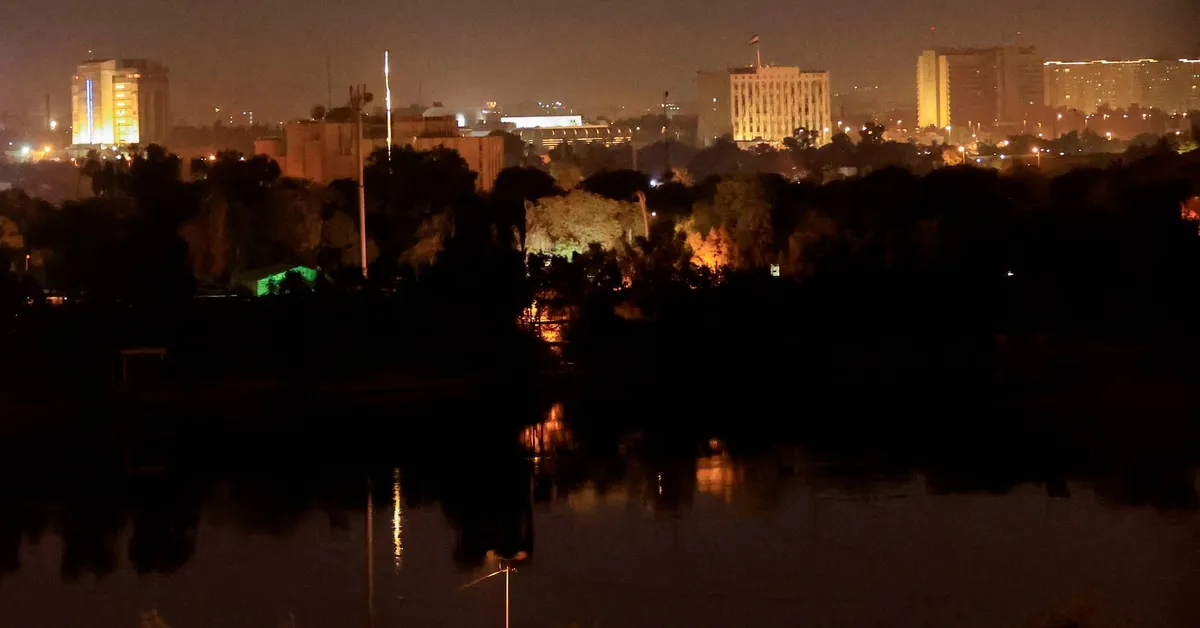
WASHINGTON/BAGHDAD, June 11 (Reuters) - In a significant move amid escalating tensions in the Middle East, the United States is preparing for a partial evacuation of its embassy in Iraq. This decision also includes the allowance for military dependents to leave various locations across the region due to rising security concerns, as reported by U.S. and Iraqi sources on Wednesday.
The sources, comprising four U.S. and two Iraqi officials, did not disclose specific details regarding the security risks that prompted this decision. However, the announcement of potential evacuations has resulted in a notable increase in oil prices, which surged by more than 4% in response. The U.S. State Department regularly evaluates the safety of American personnel stationed abroad. According to White House spokeswoman Anna Kelly, this decision followed a recent review of security conditions, though she did not provide further insights.
A White House official confirmed that U.S. President Donald Trump is aware of the evacuation plans. These partial evacuations come at a time of heightened regional tensions, particularly following 18 months of conflict in Gaza, which has raised fears of a broader confrontation involving the U.S., Israel, and Iran, along with its allied factions.
President Trump has expressed increasing frustration regarding Iran’s nuclear ambitions, asserting that he is growing less confident about Tehran's willingness to halt uranium enrichment—a critical demand from the U.S. In a related statement, Iranian Defence Minister Aziz Nasirzadeh warned that Iran would retaliate against U.S. bases in the region if the nuclear negotiations fail and the country faces military strikes.
The United States maintains a military presence in Iraq, Kuwait, Qatar, Bahrain, and the United Arab Emirates. U.S. Defense Secretary Pete Hegseth has authorized the voluntary departure of military dependents from various Middle Eastern locations, primarily affecting families stationed in Bahrain, where the majority are based.
The U.S. State Department is planning an ordered departure for personnel at the U.S. embassy in Baghdad, aiming to facilitate this through commercial means. However, the U.S. military is prepared to assist if necessary, as indicated by a third official. An Iraqi foreign ministry source confirmed the partial evacuation of U.S. embassy staff, citing potential security concerns linked to rising regional tensions.
Despite the evacuation plans in Baghdad, operations at Al Udeid Air Base in Qatar, the largest U.S. military base in the Middle East, remain unchanged. No evacuation order has been issued for employees or their families at the U.S. embassy in Qatar, which continues to operate normally.
Following reports of the Baghdad embassy evacuation, oil futures rose by $3, with Brent crude futures reaching $69.18 per barrel. Earlier on Wednesday, Britain’s maritime agency issued a warning that escalating tensions in the Middle East could lead to increased military activity, potentially affecting shipping routes in vital waterways. They advised vessels to exercise caution while navigating through the Gulf, the Gulf of Oman, and the Straits of Hormuz, areas that border Iran.
Iraq, which maintains a unique position as a regional partner to both the United States and Iran, currently hosts approximately 2,500 U.S. troops and has armed factions aligned with Tehran integrated into its security forces. Since the onset of the Gaza conflict in October 2023, tensions within Iraq have intensified, with Iran-aligned groups frequently targeting U.S. personnel. In a similar vein, Israel, a key U.S. ally in the region, has conducted strikes against Iran-aligned targets, including Iraqi armed groups operating within Iraq and in neighboring Syria.
In response to these developments, Iran's mission to the United Nations stated on social media platform X, emphasizing that threats of “overwhelming force” will not alter the reality: Iran does not seek a nuclear weapon, and U.S. militarism only serves to exacerbate regional instability. This statement was likely a reaction to comments made by U.S. Central Command chief, Army General Michael Kurilla, indicating that he had presented President Trump with a range of options to counter a potential nuclear-armed Iran.
Reporting by Daphne Psaledakis, Idrees Ali, and Steve Holland in Washington, along with Ahmed Rasheed and Timour Azhari in Baghdad, and Parisa Hafezi in Dubai; writing by Jaidaa Taha, Yomna Ehab, and Angus McDowall; editing by Deepa Babington.